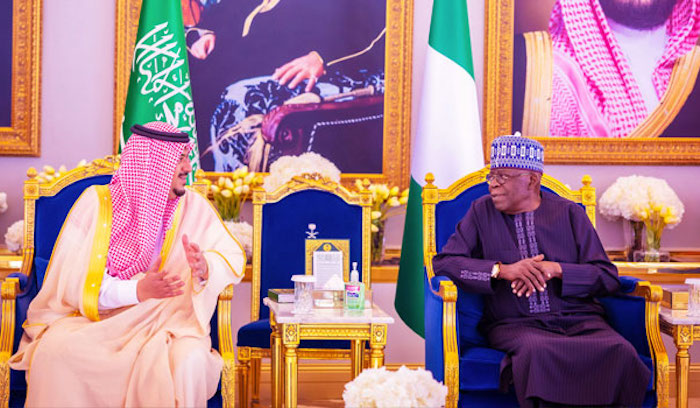Rewriting The Narrative: Nigeria-Saudi Arabia Cooperation Beyond Oil

- By Abidemi Adebamiwa
Nigeria and Saudi Arabia are embarking on an exciting journey to reshape their economies. For many years, both countries have depended heavily on oil, which has made them vulnerable to price changes on the global market. However, with the world shifting towards renewable energy and the need for economic diversity, it’s time for both nations to explore new opportunities and partnerships.
Recent meetings between Nigerian President Bola Ahmed Tinubu and Saudi Crown Prince Mohammed bin Salman have set the stage for cooperation that goes beyond oil, focusing on renewable energy, agriculture, technology, trade, and military support.
During the Joint Arab-Islamic Summit in Riyadh, Crown Prince Mohammed bin Salman praised President Tinubu for his ambitious economic reforms, drawing parallels with Saudi Arabia’s Vision 2030, a plan to transform their economy. The two leaders discussed exciting new projects in oil and gas, agriculture, infrastructure, and security. They proposed creating the Saudi-Nigeria Business Council to encourage investments and trade while also exploring defense collaboration. These developments show a fresh commitment to strengthening their relationship and finding innovative solutions to common challenges.
Military cooperation between Nigeria and Saudi Arabia could greatly enhance regional stability. Both countries face serious security issues, including terrorism and cross-border crime. Saudi Arabia has extensive experience in counterterrorism, particularly in dealing with extremist groups. Nigeria, which is still combating Boko Haram and other insurgent groups, could benefit from Saudi expertise in intelligence, military training, and advanced technology.
READ ALSO:
- Unruly Behaviour: French Citizen Deboarded By Air France At Abuja Airport
- Closing The Book Of Prejudice On France
Recently, discussions have included sharing military intelligence and strategies to combat terrorism. Saudi Arabia leads the Islamic Military Counter Terrorism Coalition (IMCTC), a group of 41 nations fighting terrorism, providing Nigeria with a chance to strengthen its defenses. By working together, both countries can better address threats and boost security in the West African region through joint military exercises and training programs.
Saudi Arabia’s ambitious Vision 2030 includes significant investments in renewable energy, like the Neom smart city project powered entirely by solar and wind energy. Nigeria, with its abundant sunlight and energy challenges, stands to gain a lot from Saudi expertise in this area. Collaborative renewable energy projects could electrify millions of Nigerian homes, create green jobs, and help reduce the country’s carbon footprint. These efforts would not only tackle energy poverty but also position both nations as leaders in the global shift towards clean energy.
Conversations between President Tinubu and Saudi energy leaders have highlighted the importance of technology transfer and joint ventures. These initiatives could help Nigeria achieve its renewable energy goals while driving local innovation. By partnering up, Saudi Arabia and Nigeria could create a sustainable energy framework that benefits both countries economically and environmentally.
Agriculture is another key area in this budding partnership. Saudi Arabia has already invested $1.24 billion in Nigeria’s leading agricultural firm, Olam Agri, through its Saudi Agricultural and Livestock Investment Company (SALIC). They are discussing expanding this investment to further enhance Nigeria’s agricultural sector. This partnership could improve food security, create job opportunities, and reduce Nigeria’s reliance on food imports, transforming it into a regional agricultural powerhouse.
Nigeria’s vast arable land and untapped agricultural potential align perfectly with Saudi Arabia’s focus on food security. Collaborative projects could boost food production, improve supply chains, and build a strong agricultural sector. This is especially important as Nigeria aims to diversify its economy away from oil.
Trade diversification is also a priority for both nations. Nigeria’s current trading relationships, particularly with China, often lead to imbalances, focusing on raw material exports. Saudi Arabia offers a more balanced alternative, showing interest in importing high-value agricultural products and manufactured goods from Nigeria. By utilizing export credit facilities from the Saudi EXIM Bank, Nigeria can strengthen its industries and create a more balanced trade relationship.
The proposed $5 billion bilateral trade agreement between Nigeria and Saudi Arabia highlights the potential for expanded trade. This agreement would give Nigerian businesses access to new markets while allowing Saudi Arabia to diversify its imports. By focusing on value-added products, the partnership could spark industrial growth and reduce Nigeria’s dependency on raw material exports, leading to job creation in both countries.
Tourism is another exciting area for collaboration. Saudi Arabia aims to expand its tourism sector beyond religious visits, focusing on cultural and recreational attractions. Nigeria, rich in natural wonders and cultural heritage, remains an untapped destination. By working together on tourism marketing and infrastructure development, both nations can unlock new revenue streams while fostering mutual understanding and connections between their people.
Cultural diplomacy adds a unique flavor to the Nigeria-Saudi relationship, enhancing their economic collaboration. Saudi Arabia’s leadership in global Islamic organizations offers Nigeria a platform to amplify its voice in the Muslim world. Initiatives like interfaith dialogues, scholarships for Nigerian students, and joint cultural events can deepen bonds and foster mutual respect.
Technology and innovation are also vital in this partnership. Saudi Arabia’s Vision 2030 emphasizes advancements in artificial intelligence and smart infrastructure, aligning with Nigeria’s ambitions to build a thriving digital economy. Recent discussions have explored collaborative projects to improve Nigeria’s public services and encourage local innovation.
The humanitarian aspect of this partnership is crucial, especially as Nigeria continues to face challenges like conflict and displacement. The northeastern region, heavily affected by insurgency, requires both immediate relief and long-term development solutions. Saudi Arabia, with its experience in humanitarian aid, could play a critical role in supporting reconstruction and rehabilitation efforts.
The establishment of the Saudi-Nigeria Business Council will ensure that these collaborations lead to real results. By providing structured platforms for dialogue and monitoring progress, this council will help both nations capitalize on emerging opportunities and ensure that ambitious plans translate into tangible benefits for their citizens.
This partnership also positions both countries to counterbalance growing external influences, particularly from China. While China’s involvement in Africa has provided significant infrastructure, it often comes with high debt burdens. Saudi Arabia offers a more sustainable model of collaboration, emphasizing shared growth and responsible investment.
Nigeria and Saudi Arabia are at an exciting crossroads where they can redefine their economic and military futures. By focusing on renewable energy, agriculture, trade, technology, and military cooperation, they can build resilient economies and enhance regional security. This partnership not only aligns with their national goals but also sets a precedent for other nations seeking comprehensive development. Together, they are creating a model for collaboration that transcends borders and fosters prosperity for their people and the wider region.
The opinions expressed in this publication are solely those of the author. It does not represent the editorial position or opinion of OSUN DEFENDER.









